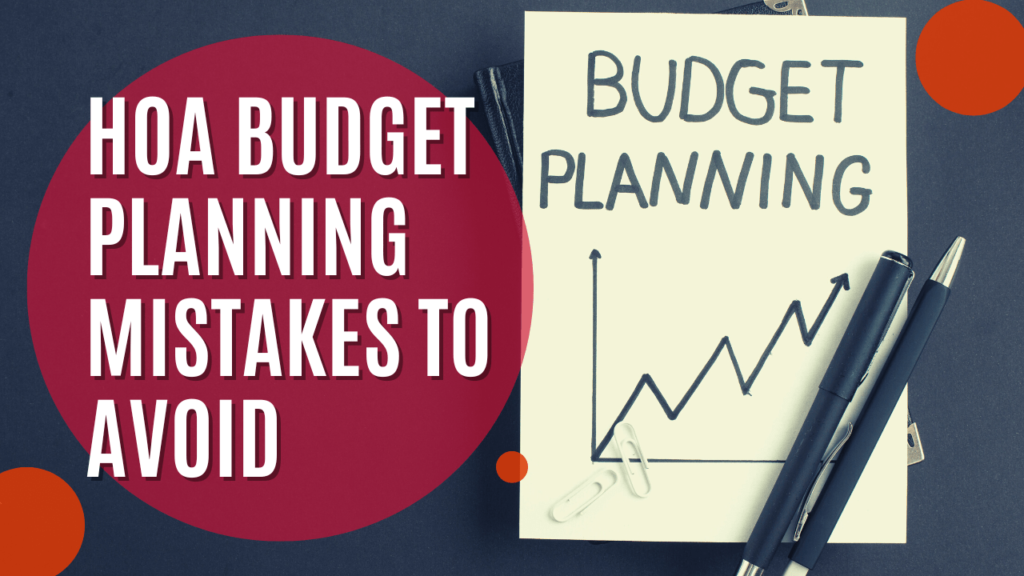Poor bookkeeping habits, missing financial reports, and a lack of organization will sink your HOA’s budget faster than an unexpected bill. You cannot put together a budget that serves your community without a good budget process.
When carefully planned and accurate, your HOA budget will improve the lives of everyone in the community. Your budget ensures that the association can pay for what it needs. The budget establishes a path forward and creates more resources for improvements, maintenance, and amenities for residents.
A budget done poorly, however, can be a disaster for your community. If there are mistakes made, residents will face emergency assessments. Projects will remain unfunded and in the worst case scenario, the association could go bankrupt.
Avoid financial problems in your community by avoiding these common HOA budget planning mistakes.
Ignoring Last Year’s Budget
The current budget must start with last year’s budget. This is the best way to get an accurate estimate of the upcoming year’s expenses. Check out the current budget as well as last year’s budget and even the budget the year before. This helps you identify trends and prepare for rising costs.
You might also find some mistakes that were made in previous budgets. Why make those mistakes again?
Evaluating previous budgets as you prepare to create a new budget allows you to account for inflation and any changes in vendors that may increase costs. Always start with the past when you’re planning for the future.
Forgetting to Itemize Expenses
You may be bored to death by every line item that can show up in an HOA budget. These financials are always extremely detailed, but that’s for a very good reason. Don’t lump a series of expenses into one budget section. “Maintenance” is a broad category and you don’t really know what you’re going to pay for plumbers, roofers, HVAC technicians, and electricians. So break out all of those sub-categories in your budget instead of just calling everything “maintenance.”
Yes, it’s more time consuming. Yes, it requires you to think about how you’ll allocate funds for each subsection, but it will result in a more accurate budget and a better-funded maintenance plan.
Itemize specific expenses. You’ll have more accuracy in how funds are disbursed throughout your budget.
If you don’t itemize, you’ll have trouble accurately budgeting. You might overspend on landscaping or not allocate enough to cover the annual HVAC inspection. Then, you’ll be moving money around or dipping into the reserve fund to pay for things you did not anticipate. The entire maintenance budget might be spent two months into the year.
Avoid this with a careful attention to detail. Itemize everything.
Expecting Costs to Stay the Same
Maybe you budgeted a certain amount for landscaping, but by the end of the year those landscaping costs have doubled. How will you make up for the money you did not anticipate spending?
It is often necessary to over-budget in order to not be surprised by rising costs.
We don’t have to tell you about inflation. Everyone is paying more today for things like gas, food, housing, and basic services. Your HOA is feeling it, too. Make sure your budget reflects the rising costs of what you need.
It’s a huge mistake not to have a buffer in your budget.
Budget for more than you expect to pay.
This creates some breathing room and less stress when you have to pay the bills. Your residents will appreciate that there’s no need for special assessments to cover the higher costs the board didn’t anticipate or budget for.
Automatically Renewing Vendor Contracts
If you’ve used the same painting crew for five years, it may feel like a given that you’ll hire them every time you need painting. Changing your landscaping team might seem like a lot of unnecessary work. But, if you’re losing money because you haven’t asked for RFPs from competing companies, that’s a huge mistake.
When it comes time to plan your HOA’s new annual budget, take the time to re-evaluate your vendor contracts as well. Are they worth what they’re charging? Are you and your homeowners happy with their quality of work?
You need to track vendor costs year-over-year to find out how much those costs are increasing and whether you can see the added value or services that you’re receiving for those high costs. If you’ve been with a particular vendor for a number of years and you really like their work, don’t be afraid to ask for a discount. Most professionals will give their most loyal customers their best prices.
If you’re unsatisfied with your vendors or their new rates, look around for new vendors who may offer the same quality for better prices. Instead of automatically renewing service contracts with vendors, take a look around. You might ultimately end up staying with the companies you currently use, but it’s helpful during the budget process to do some comparison shopping.
Failing to Document and be Transparent
Do your homeowners know where to find the budget?
Is it easy for them to see where their money is going?
One of the biggest mistakes any association can make is not documenting financial transactions accurately and transparently.
You need to have a solid accounting system in place that can clearly and accurately demonstrate income, expenses, and projections. You’ll need to point to your reserve fund anytime someone asks about its health. Keep track of cash flow and accounts payable.
It’s a huge mistake not to be utilizing the best technology that’s available when it comes to budgeting. Everything should be accessible.
We want to help your HOA board create a better budgetary process. We want you to avoid these common mistakes and others. Let us help you.

Contact us at Hill & Co. so we can tell you more about the HOA services we provide in California for HOA boards and community associations just like yours. We can deliver full-service management or virtual management if you’re looking for something more flexible and cost-effective.

